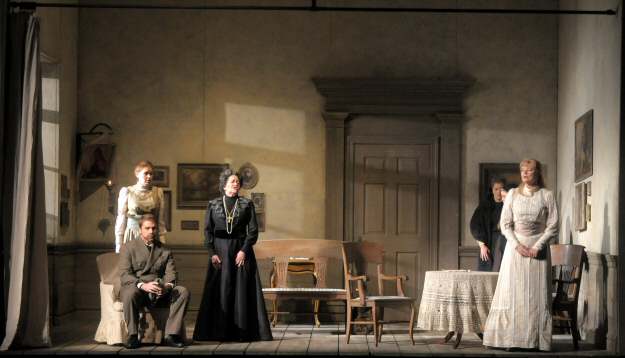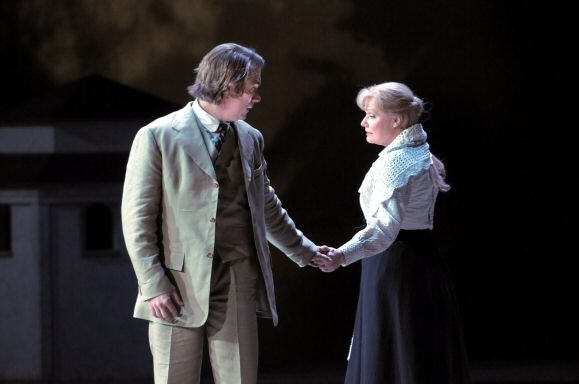Other Links
Editorial Board
-
Editor - Bill Kenny
- Founder - Len Mullenger
Google Site Search
SEEN AND HEARD
INTERNATIONAL OPERA REVIEW
Janáček, Katya Kabanova: Soloists, Chorus and Orchestra of Lyric Opera of Chicago, Markus Stenz (conductor) Civic Opera House, Chicago, 28.11.2009 (JLZ)
Production:
Original Production: Jonathan Miller
Stage Director: Paula Williams
Set and Costume Designer: Robert Israel
Lighting: Duane Schuler
Chorus Master: Donald Nally
Conductor: Markus Stenz
Cast:
Kudrjáš:Garrett Sorenson
Glaša:Kathryn Leemhuis
Dikoj:Andrew Shore
Boris:Brandon Jovanovich
Fekluša:Pamela Williams
Kabanicha:Judith Forst
Tichon:Jason Collins
Varvara:Liora Grodnikaite
Katya: Karita Mattila
Kuligin: Paula La Rosa

The Kabanov Household
Leoš Janáček’s 1921 opera Katya Kabanova is based on the 1860 play The Storm by Alexander Ostrovsky, and the title of the source is a key element in its musical adaptation. Just as the storm is critical to Ostrovsky’s play, the tempest depicted at the beginning of the opera’s third act is one of the composer’s most powerful musical conceptions, and its presentation at Lyric Opera of Chicago is impressive for the way in which it brings together the various elements of this work. The drama, music, dialogue, and imagery must fuse well to make this scene intelligible, and the focus Markus Stenz gave this climactic scene conveyed the intensity of one of the composer's most powerful stage works.
Karita Mattila seems perfectly suited to the role of Katya, a figure which she portrays as able to stand up to the verbal and emotional assaults of her domineering mother-in-law, Kabanicha, here portrayed by Judith Forst. As Katya, Mattila gave life to her character by expressing not only the powerful emotional outbursts that are essential to the first scene, but also the profound despair of the final part of the drama. Musically, Mattila gave an almost flawless performance, which required both a soaring upper register (for example, in the exchange with Varvara about the freedom of birds), as well as a clearly articulated lower register, most memorable in the storm scene. The latter passage, the almost unexpected confession, worked well in the speech rhythms which are at the core of vocal line in Janáček operas and Mattila allows her voice to suggest a kind of delirium, which leads her to blurt the name of her lover, and then the madness that possesses her in the final scene.
Mattila dominates the stage in the second half of the opera, a woman liberated from the oppressive household through her doomed quest for freedom in taking a lover. Already berated by the staid and demanding Kabanicha for deviating from convention, Varvara gives her the opportunity to react to her inner daimon without regard for the harm she should wreak upon Tichon and ultimately on his relationship with his mother. Mattila made Katya believable, not only vocally, but also through her acting. Her final moments remind one of expressionist drama, especially when Katya hears the Volga in the off-stage chorus, which emerges from the orchestra timbres just loudly enough. To this Katya responds almost dementedly, and at that point it is clear from Mattila’s interpretation of the role that Katya can neverreturn to conventional life in Kabanicha’s household.
As Katya’s foster sister Varvara, the Lithuanian-born mezzo Liora Grodnikaite gave an equally persuasive performance. Her command of the musical line was masterful, but it was her acting that made Varvara a foil for Katya. In the latter part of the first act, Katya even comments that it is unseemly for her to confide so much to Varvara, who is too young to understand such things, and it is a tribute to Liora Grodnikaite that she made Varvara seem believable in this way. The immaturity which prompts Varvara to entice Katya to indiscretion was clearly apparent in the acting: here Varvara urged Katya on, not only in the vocal exchange between the characters, but also by means of eye contact and body language.

Jovanovich (Boris) and Karita Mattila (Katya)
Boris was sung by tenor Brandon Jovanovich, who worked well with Mattila in this production. While this part is more declamatory in the first act, it becomes increasingly lyrical in the second and in this regard Jovanovich's Boris is extremely effective, especially in the demanding love duet at the end of the second act. His voice made the passionate outbursts believable, including the off-stage passages, where his voice blended beautifully with Mattila's. As in love as Boris is with Katya, Jovanovich allows his character to display surprise when Mattila names him as her lover in the third act. In terms of drama, Boris must be uncomprehending when he confronts the tortured Katya in the final scene, and his portrayal conveyed every bit of that too.
Katya's husband Tichon was performed convincingly by Jason Collins. As the bullied son of Kabanicha, Tichon is a complex role, and Collins was able to suggest his frustration with his mother and his fascination for Katya very convincingly.
As Kabanicha, Judith Forst faced the challenge of her unrelenting character without resorting to histrionics. At times it was not easy to hear her, though that may be attributed to the acoustics of the set. The solid, four-square house of the first two acts seemed confining, and it may easily have trapped Forst’s voice. Kabanicha is not a pleasant character, but she must be believable and not a caricature : Forst did that well, with the declamatory style of Kabanicha contrasting with the soaring vocal depiction of Katya. Kabanicha also has the final lines of the opera, lines that heighten the tragic conclusion.
The character of Kudrjáš, Varvara’s lover, is not confined to the household at the core of this opera. Rather, he stands apart, always outside the house in which the Kabanovs live, and his music reinforces that sense of distance. Kudrjáš is the first voice heard in the opera, and it is he who tells Boris of the situation at the Kabanovs. Later, he plays a critical role in the love scene, since it is he that sings the music which signals to Katya and Boris that they must end their tryst. As Kudrjáš, Garrett Sorenson created an appealing character, and he gave the folksong passages in the score a distinctive style which set them apart from the other, more conventional music his character has when dealing with Varvara or Boris. Sorenson worked well with Grodnikaite in the second act too, especially the second scene when they set up the pivotal meeting between Boris and Katya.
In addition to the fine vocal performances, the orchestral sound was also outstanding with a fine interpretation of the score. Markus Stenz gave a sensitive reading, which resulted in a solid sound that never overshadowed the voices and was not overpowering even in the storm scene. In other passages, as in the opening of the final scene, Stenz was subtle and unobtrusive, and reliable when it came to bringing out Janáček’s distinctive colors. Stenz’s clear direction was palpable both in the pit and, at times, in the careful attention he gave to the principals on stage. Throughout the evening the full sound Stenz drew from the orchestra, combined with his sensitive interpretation and attention to the needs of the singers, made this a compelling performance.
It was a pleasure to see Katya Kabanova included in Lyric Opera of Chicago’s current season and featuring one of the finest singers available in the title role.
James L. Zychowicz
Pictures © Dan Rest
